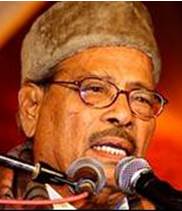By Samar Saha   e-mail: samar_k_saha@yahoo.com
Manna Dey, the senior-most among the musical legends of Bollywood’s golden era, died on October 24, 2013 in Bangalore. Mohammad Rafi, Mukesh, Kishore Kumar, and Manna Dey made up the “famous quartet of singers” who dominated the Hindi film music from 1950s to 1980s. In an illustrious career spanning seven decades since 1943, Manna Dey sang over 3,500 songs. His oeuvre boasts of a range of songs—Hindustani and Karnatic classicals, Qawwalis, romantic love songs, western dance numbers and fun-filled folk songs.
Childhood: Probodh Chandra Dey, known by his stage name Manna Dey, was born to Mahamaya and Purna Chandra Dey on May 1, 1919 in north Calcutta. He attended Scottish Church Collegiate School and graduated from Vidyasagar College. Inspired by his paternal uncle, Sangeeta-acharya Krishna Chandra Dey (K.C.Dey), he began taking music lessons from him and Ustad Dabir Khan from an early age.
Early Career: In 1942, Manna Dey went to Bombay with his uncle K.C.Dey and worked as an assistant music director for him, then for S.D.Burman and others, before working independently as a music director. He continued to learn Hindustani music from Ustads Aman Ali Khan and Abdul Rahman Khan. Manna Dey got his break in playback singing in the movie Tamanna in 1942. He sang a duet with Suraiya Jago Aayee Usha Ponchi Boley Jago, an instant hit. Between 1945 and 1947, his songs, both solo and duets with Suraiya, Meena Kapoor, and Amira Bai, became chart busters. His first songs for S.D.Burman, Upar Gagan Vishal and Duniya Ke Logo in Mashal (1950) were super hits. From 1952 Manna Dey diversified as a lead singer in Bengali and Marathi films.
Peak Years – 1953 to 1969: In his peak from 1953 to 1969, he recorded 758 Hindi songs, 631 of them between 1957 and 1969. He worked with all leading music directors—Anil Biswas, Naushad, Shankar Jaikishan, S.D. & R.D. Burman, Laxmikant Pyare Lal, Vasant Desai, Avinash Vyas, S.N.Tripathi, Nissar Bazmi, O.P.Nayyar, G.Ramanathan, T.G.Lingappa, Salil Choudhuri , C.Ramachandra, among others.
Mellowed Years – 1970 to 1991: With resurgence of Kishore Kumar in the 1970s with his folk, pop, western and light classical songs, it appeared that careers of Mukesh, Rafi and Manna Dey would be over. Not so. He received a fresh lease of life in Bollywood from 1971 after Rajesh Khanna persuaded music directors to picturize or feature Manna Dey’s songs in films. After recording over 500 songs in Hindi films during 1970-83, he became selective of the kinds of songs he chose to lend his voice to, opting to do less work in Hindi.
Other Indian Languages: He also sang in Bengali, Assamese, Oriya, Marathi, Gujarati, Kannada, Malayalam, Bhojpuri, and Nepali. His solo and duet film Malayalam songs under Salil Choudhri in Chemmeen— Maanasamaine Varoo and Chemba Chemba—were super hits. Similarly Kannada film songs like Jayate, Jayate, Satyameva Jayate and Kuhu Kuhu are still as popular as when they first came out. His Guajarati and Marathi songs similarly were major hits. Manna Dey sang over 1250 Bengali songs. His voice spanned the whole of India.
Personal Life: In 1953 Manna Dey married Sulochana Kumaran. They had two daughters, Shuroma (b. 1956) and Sumita (b. 1958). Sulochana died in January 2012. After her death, Dey moved to Bangalore after 50-plus years in Bombay. Manna Dey, for all his accomplishments, lived a simple, elegant life, even doing his own daily groceries!
My Tribute: A part of me has moved on with Manna Dey. I am not sad to see him go. Ninety-four years of life is a great age to end. Why would anyone wish to struggle and crawl through another day after having done all that one could? How did he feel not seeing someone younger and better than him? I never met Manna Dey. If I had, I would have asked him about this. Well Manna-da, you have done so well for all of us. Now you rest well.
Sources consulted for this story:
- Autobiography in Bengali, Jeeboner Jalsaghorey, Ananda Publishers, Kolkata.
- Autobiography, Memories Come Alive, Penguin Books, A biography in Bengali, Manna Dey
- Mannyoboreshu, by Dr Gautam Roy, Anjali Publishers, Kolkata.
- Manna Dey’s obituary in The Times of India by Avijit Ghosh.

